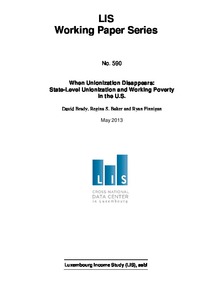When unionization disappears: state-level unionization and working poverty in the U.S.
"Although the working poor are a much larger population than the unemployed poor, American poverty research has devoted much more attention to joblessness than to working poverty. Research that does exist on working poverty concentrates on demographics and economic performance and neglects inst...
| Main Authors: | , , |
|---|---|
| Institution: | ETUI-European Trade Union Institute |
| Format: | TEXT |
| Language: | English |
| Published: |
Luxembourg
2013
LIS |
| Subjects: | |
| Online Access: | https://www.labourline.org/KENTIKA-19126966124919441489-When-unionization-disappears-s.htm |
| _version_ | 1771659897719488513 |
|---|---|
| author | Brady, David Baker, Regina Finnigan, Ryan |
| author_facet | Brady, David Baker, Regina Finnigan, Ryan |
| collection | Library items |
| description | "Although the working poor are a much larger population than the unemployed poor, American poverty research has devoted much more attention to joblessness than to working poverty. Research that does exist on working poverty concentrates on demographics and economic performance and neglects institutions. Building on literatures on comparative institutions, unionization, and states as polities, we examine the influence of a potentially important labor market institution for working poverty: the level of unionization in a state. Using the Luxembourg Income Study (LIS) for the U.S., we estimate: a) multi-level logit models of poverty among employed households in 2010; and b) two-way fixed effects models of working poverty across seven waves of data from 1991 to 2010. Further, we replicate the analyses with the Current Population Survey while controlling for household unionization, and assess unionization’s potential influence on selection into employment. Across all models, state-level unionization is robustly significantly negative for working poverty. The effects of unionization are larger than the effects of states’ economic performance and social policies. Further, unionization reduces working poverty for both unionized and non-union households and does not appear to discourage employment. We conclude that American poverty research can advance by devoting greater attention to working poverty, and by incorporating insights from the comparative literature on institutions." |
| format | TEXT |
| geographic | USA |
| id | 19126966124919441489_1315de1bc07a44be9f6c7b48f0544433 |
| institution | ETUI-European Trade Union Institute |
| is_hierarchy_id | 19126966124919441489_1315de1bc07a44be9f6c7b48f0544433 |
| is_hierarchy_title | When unionization disappears: state-level unionization and working poverty in the U.S. |
| language | English |
| physical | 56 p. Digital |
| publishDate | 2013 |
| publisher | Luxembourg LIS |
| spellingShingle | Brady, David Baker, Regina Finnigan, Ryan low wages poverty trade unionization working poor When unionization disappears: state-level unionization and working poverty in the U.S. |
| thumbnail | https://www.labourline.org/Image_prev.jpg?Archive=100517992879 |
| title | When unionization disappears: state-level unionization and working poverty in the U.S. |
| topic | low wages poverty trade unionization working poor |
| url | https://www.labourline.org/KENTIKA-19126966124919441489-When-unionization-disappears-s.htm |

